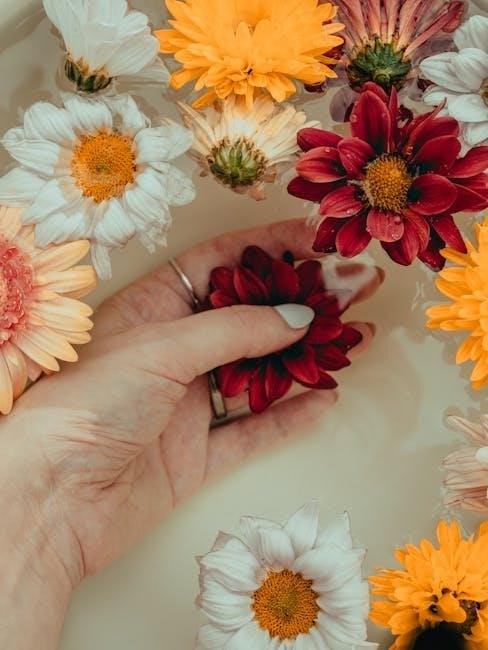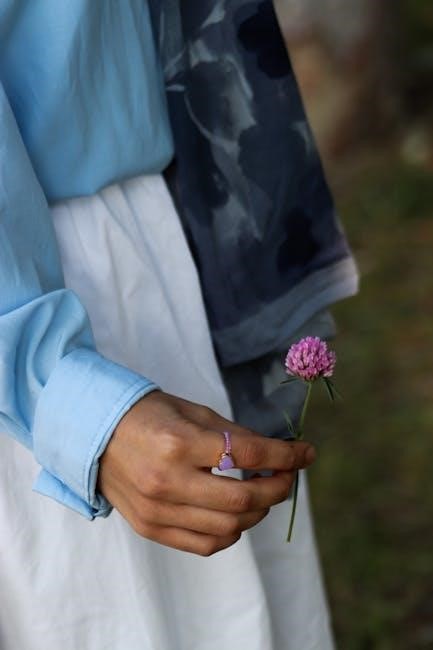therapeutic jenga questions pdf
Therapeutic Jenga Questions offer a fun‚ engaging tool for fostering emotional expression and meaningful conversations in therapy. By incorporating open-ended questions on Jenga blocks‚ therapists create a non-threatening environment for clients to explore their thoughts and feelings. This innovative approach combines play with reflection‚ making it accessible for various age groups and therapeutic needs. A PDF resource with 50 thoughtfully designed questions is available for easy use in sessions.
1.1 What is Therapeutic Jenga?
Therapeutic Jenga is a creative‚ play-based tool that combines the classic Jenga game with thoughtfully designed questions. Each numbered block corresponds to a specific question‚ encouraging emotional expression and self-reflection. The game is prepared by writing questions on the blocks or using a downloadable PDF list. It’s a versatile activity suitable for various age groups‚ fostering meaningful conversations in a fun‚ non-threatening way.
1.2 The Purpose of Jenga Questions in Therapy
The purpose of Jenga questions in therapy is to encourage emotional expression‚ deepen self-reflection‚ and foster meaningful conversations. By using numbered blocks linked to a downloadable PDF list of questions‚ therapists create a safe‚ engaging environment for clients to explore their thoughts‚ feelings‚ and experiences. This playful approach helps build trust and facilitates deeper connections during therapeutic sessions.
Benefits of Using Jenga in Therapy
Therapeutic Jenga fosters emotional expression and self-reflection through playful interaction. It creates a non-threatening environment‚ encouraging clients to share openly and build trust‚ enhancing therapy outcomes.
2.1 Encouraging Emotional Expression
Therapeutic Jenga encourages emotional expression by providing a safe‚ engaging environment for clients to share thoughts and feelings. Open-ended questions on the blocks prompt meaningful dialogue‚ helping individuals articulate emotions and experiences. This playful approach reduces anxiety‚ making it easier for clients‚ especially children and teens‚ to communicate openly. The PDF resource offers a practical tool for therapists to facilitate emotional exploration.
2.2 Deepening Self-Reflection and Meaningful Conversations
Therapeutic Jenga questions are designed to prompt self-reflection and foster meaningful conversations. By addressing topics like emotions‚ experiences‚ and goals‚ clients gain insight into their thoughts and behaviors. The structured yet playful nature of the game encourages open dialogue‚ helping individuals connect deeply with their feelings and others. This tool is particularly effective in creating a non-threatening space for introspection and connection.

How to Create a Therapeutic Jenga Set
Start with a standard Jenga set. Number each block using sharpies and organize questions by theme or depth. Print and laminate the question list for easy reference during sessions.
3.1 Materials Needed
To create a therapeutic Jenga set‚ you’ll need a standard Jenga game‚ sharpies‚ paper‚ and a pen. Print a list of questions or laminate them for durability. Optional colored sharpies can enhance organization. Secure storage is recommended to protect the set. This setup ensures a ready-to-use tool for therapy sessions‚ adaptable for various age groups and therapeutic goals.
3.2 Numbering and Organizing Questions
Number each Jenga block from 1 to 45 using sharpies‚ leaving 9 blank for flexibility. Organize questions into categories like icebreakers‚ deep reflections‚ or age-specific queries. Use a PDF list of 50-54 questions‚ ensuring they are clear‚ engaging‚ and relevant to therapeutic goals. This system allows easy adaptation for different clients and sessions‚ promoting structured yet meaningful interactions during therapy.
3.3 Preparing the Jenga Blocks
Prepare Jenga blocks by numbering them from 1 to 45 using sharpies‚ leaving 9 blank. Write questions on a separate PDF list‚ avoiding writing directly on blocks. Stack them as in a standard Jenga game. Ensure the set is stored securely to prevent damage‚ making it ready for therapeutic use while maintaining organization and accessibility for sessions.

How to Play Therapeutic Jenga
Players take turns drawing numbered Jenga blocks‚ answering questions from a corresponding PDF list. The game combines physical skill with emotional engagement‚ fostering open conversations and reflection.
4.1 Basic Rules of the Game
Players take turns removing numbered Jenga blocks‚ answering corresponding questions from a PDF list. Each block is numbered 1-54‚ with 9 left blank. The game starts with a stacked tower; players must pull blocks without causing a collapse. After removing a block‚ the player answers the question before placing it on top. This structure encourages focus and thoughtful engagement‚ blending physical skill with emotional reflection in a therapeutic setting.
4.2 Adapting the Game for Different Age Groups
Therapeutic Jenga can be tailored for various ages. For children‚ use simple‚ fun questions about favorites or feelings. For teens and adults‚ incorporate deeper‚ reflective queries. A PDF list of 50 questions offers versatility‚ allowing therapists to select prompts suitable for different developmental stages‚ ensuring engagement and relevance for all participants. This adaptability makes the game effective across diverse client demographics.
Types of Questions for Therapeutic Jenga
Therapeutic Jenga includes icebreaker questions‚ deep thought-provoking inquiries‚ and age-specific prompts for kids and teens. A PDF with 50 versatile questions is available for easy use.
5.1 Icebreaker Questions
Icebreaker questions in Therapeutic Jenga are designed to be fun and engaging‚ helping participants feel comfortable. Examples include asking about favorite animals or hypothetical scenarios‚ encouraging light-hearted conversations. These questions ease tension and foster connection‚ making them ideal for initial sessions. A PDF list of such prompts is available‚ offering a variety of options suitable for diverse groups and settings; This approach creates a safe and interactive environment for clients to open up.
5.2 Deep‚ Thought-Provoking Questions
Deep‚ thought-provoking questions in therapeutic Jenga are crafted to encourage introspection and emotional exploration. Examples include inquiries about personal values‚ fears‚ and aspirations. These questions help clients gain insights into their emotions and experiences‚ fostering a deeper understanding of themselves. They are designed to assist clients in working through challenges and achieving personal growth‚ making therapy sessions more impactful and meaningful. A PDF resource offers a curated list of such questions for easy use in therapeutic settings.
5.3 Age-Specific Questions for Kids and Teens
Therapeutic Jenga questions for kids and teens are designed to be simple‚ engaging‚ and relevant to their lives. Examples include inquiries about favorite animals or activities that bring comfort. These age-specific questions help younger clients express their thoughts and feelings in a fun and accessible way. A PDF resource provides tailored prompts for children and adolescents‚ ensuring therapy is both enjoyable and effective for their emotional development.

Customizing Questions for Specific Needs
Therapeutic Jenga questions can be tailored to meet individual or group needs‚ ensuring relevant and meaningful discussions. A PDF resource provides customizable prompts for various therapeutic contexts.
6.1 Tailoring Questions for Individual Clients
Tailoring questions for individual clients ensures personalized therapy sessions. Therapists can create custom PDF lists addressing specific needs‚ such as trauma recovery or self-esteem building‚ making each session more impactful and relevant to the client’s journey. This approach fosters deeper engagement and helps clients address their unique challenges effectively. The flexibility allows therapists to adapt questions as client needs evolve over time.
6.2 Using Questions for Group Therapy Sessions
Therapeutic Jenga questions are highly effective in group therapy‚ fostering bonding and teamwork. A PDF list of curated questions can be used to encourage participation and meaningful interactions among group members. Questions like‚ “What makes you feel comforted?” or “How would you help a friend who is sad?” promote empathy and shared understanding. This approach adapts well to diverse group dynamics‚ ensuring engaging and therapeutic discussions for all participants.

Storage and Maintenance of the Jenga Set
Store the Jenga set in a secure‚ dry location to prevent damage. Use a sturdy box or bag to protect the blocks and ensure longevity for future therapeutic sessions.
7.1 Securing the Set After Use
After each session‚ carefully gather and stack the Jenga blocks to prevent damage. Store them in a sturdy box or bag to protect the numbered questions and maintain organization. This ensures the set remains intact and ready for future use‚ while also keeping the therapeutic tool clean and secure.
7.2 Preventing Damage to the Blocks
To maintain the longevity of your therapeutic Jenga set‚ ensure blocks are handled gently and stored in a sturdy‚ protective container. Clean them with a soft cloth to avoid damage and prevent exposure to harsh chemicals. Regularly inspect for wear and tear‚ addressing any issues promptly to preserve the integrity of the numbered questions and ensure continued usability in therapy sessions.
Effectiveness of Jenga in Therapy
Therapeutic Jenga has shown proven results in enhancing emotional expression and fostering meaningful connections. Positive feedback from therapists highlights its effectiveness in creating a safe‚ engaging environment for clients.
8.1 Case Studies and Success Stories
Case studies reveal that Therapeutic Jenga fosters emotional growth and connection. Children with trauma have used it to express feelings‚ while adults report increased self-awareness. Success stories highlight its effectiveness in building trust and encouraging honest dialogue‚ making it a valuable tool for therapists working with diverse populations and needs.
8.2 Feedback from Therapists and Clients
Therapists praise Therapeutic Jenga for its ability to foster engagement and emotional expression. Clients‚ including children and adults‚ report feeling comfortable sharing thoughts due to the game’s non-threatening nature. Many highlight its effectiveness in building trust and sparking meaningful conversations‚ making it a valued tool for therapeutic settings and group activities alike.

Cultural and Individual Considerations
Therapeutic Jenga questions must be adapted for cultural sensitivity and individual needs. Tailoring questions ensures inclusivity and relevance‚ making the tool effective for diverse clients and settings.
9.1 Adapting Questions for Diverse Populations
Therapeutic Jenga questions can be tailored to suit diverse populations by incorporating cultural sensitivity and individualized approaches. Translating questions into different languages and integrating culturally relevant themes ensures inclusivity. Additionally‚ questions can be adjusted to address specific needs‚ such as trauma‚ age‚ or cognitive abilities‚ making the tool versatile for various client backgrounds and therapeutic contexts while maintaining its effectiveness.
9.2 Ensuring Sensitivity and Inclusivity
Ensuring sensitivity and inclusivity in therapeutic Jenga questions involves crafting prompts that respect diverse backgrounds‚ cultures‚ and experiences. Questions should avoid assumptions and stereotypes‚ focusing instead on universal themes that foster connection. Therapists must consider clients’ unique identities and tailor questions to promote a safe‚ non-judgmental space. This approach ensures all individuals feel valued and heard during sessions.
Digital Versions of Therapeutic Jenga
Digital versions offer printable PDFs of therapeutic Jenga questions‚ enabling easy access and customization. Tools allow therapists to create tailored prompts‚ enhancing flexibility in sessions.
10.1 Printable PDF Lists of Questions
Printable PDF lists of therapeutic Jenga questions provide a convenient and customizable resource for therapists. These lists include 50 thoughtfully designed prompts‚ suitable for various therapeutic settings. They can be easily downloaded‚ printed‚ and laminated for durability. Many PDFs offer mini-flashcards of questions‚ making them portable and adaptable for individual or group sessions. This format ensures therapists can quickly access and evolve the questions to meet their clients’ needs‚ fostering engaging and meaningful interactions during therapy.
10.2 Digital Tools for Creating Custom Questions
Digital tools empower therapists to craft tailored therapeutic Jenga questions with ease. Online platforms and downloadable apps allow customization‚ enabling therapists to design questions specific to individual or group needs. These tools support the creation of PDFs or flashcards‚ ensuring adaptability across diverse therapeutic contexts. They also offer templates and inspiration‚ making it simple to develop questions that align with clients’ unique circumstances and promote deeper engagement in therapy sessions.

Common Challenges and Solutions
Common challenges include managing sensitive answers and maintaining engagement. Solutions involve using open-ended questions and adapting activities to suit client needs‚ ensuring meaningful participation.
11.1 Managing Difficult or Sensitive Answers
When clients provide difficult or sensitive answers‚ therapists should employ active listening and validation. Acknowledge their feelings without judgment‚ and gently guide the conversation to explore deeper insights. Creating a safe‚ non-threatening environment is crucial. If necessary‚ adapt questions to align with the client’s emotional readiness‚ ensuring the session remains constructive and respectful of their boundaries and experiences.
11.2 Keeping Clients Engaged During Sessions
To maintain engagement‚ therapists can emphasize the playful nature of Jenga while ensuring questions are relevant and meaningful. Encouraging clients to share openly and providing positive reinforcement fosters participation. Varying question types‚ from icebreakers to deeper reflections‚ keeps the session dynamic. The interactive physical aspect of the game naturally sustains interest‚ making it easier for clients to stay focused and invested in the therapeutic process.
Examples of Therapeutic Jenga Questions
Examples include: “What would you title your autobiography?” or “Where do you feel the most safe and why?” These questions encourage reflection and emotional sharing‚ fostering deeper insights during therapy sessions.
12.1 Sample Questions for Kids
Sample questions for kids include: “If you had a pet‚ what kind would it be?”‚ “How would you help a friend who is sad?”‚ and “What makes you feel happy?”. These questions are designed to be fun and engaging‚ encouraging children to share their thoughts and feelings. A PDF resource offers a list of such questions tailored for younger ages‚ promoting emotional expression and reflection in a playful manner.
12.2 Sample Questions for Teens and Adults
Sample questions for teens and adults include: “What is your favorite animal and why?”‚ “What would you title your autobiography?”‚ and “Where do you feel the most safe and why?”. These questions encourage deeper reflection and meaningful conversations‚ helping teens and adults explore their thoughts and emotions. A PDF resource provides a comprehensive list of such questions tailored for older audiences.

Combining Jenga with Other Therapeutic Activities
Jenga can be paired with art or writing exercises‚ allowing clients to visually represent their thoughts. It also serves as a warm-up for deeper therapy‚ fostering a comfortable environment.
13.1 Pairing Jenga with Art or Writing Exercises
Combining Jenga with art or writing exercises enhances therapeutic benefits. Clients can draw scenes or write reflections inspired by Jenga questions‚ fostering deeper self-expression. This integration allows for visual representation of emotions‚ aiding in processing complex experiences. The PDF resource provides questions that can be adapted for art prompts‚ encouraging creativity and meaningful engagement during therapy sessions.
13.2 Using Jenga as a Warm-Up for Deeper Therapy
Jenga serves as an excellent warm-up activity‚ easing clients into deeper therapeutic work. By engaging in a playful‚ low-stakes environment‚ clients build trust and comfort. The structured yet flexible nature of Jenga questions helps transition seamlessly into more profound discussions. This approach fosters emotional readiness‚ making clients more receptive to exploring complex issues during subsequent therapy sessions. The PDF resource provides questions tailored for this purpose‚ ensuring a smooth progression.

The Role of Jenga in Building Rapport
Jenga fosters trust and creates a safe space through playful interaction‚ helping clients feel comfortable and build strong therapeutic relationships. The PDF resource provides questions designed to enhance this connection.
14.1 Creating a Safe Environment for Clients
Therapeutic Jenga helps establish a safe space by transforming traditional therapy into a playful‚ non-intimidating activity. Clients‚ especially children‚ feel more at ease sharing their thoughts when engaged in a familiar game. The structured yet fun nature of Jenga encourages openness‚ reducing anxiety and fostering a sense of security. This approach ensures clients feel heard and supported‚ promoting deeper engagement in therapy sessions.
14.2 Fostering Trust Through Playful Interaction
Therapeutic Jenga fosters trust by transforming therapy into a playful‚ collaborative experience. Clients feel at ease sharing their thoughts during the game‚ knowing their responses are valued. The lighthearted nature of Jenga reduces fear of judgment‚ creating a safe space for open communication. This playful interaction strengthens the therapeutic bond‚ helping clients trust the process and their therapist‚ leading to deeper emotional engagement and growth.

Future Trends in Therapeutic Jenga
Future trends include innovative question designs and digital tools for creating custom PDF lists‚ enabling tailored therapeutic approaches and expanding Jenga’s use in specialized therapies.
15.1 Innovations in Question Design
Innovations in question design for therapeutic Jenga include digital tools for creating customizable PDF lists‚ allowing therapists to tailor questions to specific client needs. Advances in technology enable dynamic question generation‚ incorporating AI to adapt queries based on client responses. This evolution ensures questions remain relevant‚ engaging‚ and effective for diverse populations‚ including children‚ teens‚ and trauma survivors.
15.2 Expanding Jenga for Specialized Therapies
Therapeutic Jenga is expanding into specialized therapies‚ such as trauma-informed care and cognitive-behavioral therapy‚ by tailoring questions to address specific emotional or behavioral challenges. Customizable PDF lists enable therapists to design targeted prompts for unique client needs. This adaptability allows Jenga to integrate seamlessly with various therapeutic modalities‚ enhancing its versatility and effectiveness in addressing diverse psychological and emotional requirements.
Resources for Therapeutic Jenga
Downloadable PDF lists of therapeutic Jenga questions are available online‚ offering customizable prompts for various therapeutic needs. Websites like www.rectherapyresources.com and books by experts provide comprehensive guides and ideas for creating effective question sets tailored to specific therapies.
16.1 Recommended Websites and Downloads
Visit www.rectherapyresources.com for a downloadable PDF featuring 50 therapeutic Jenga questions. This resource includes mini-flashcards for easy use and customization. Another recommended site is Tulsa Camp Fire‚ offering printable PDFs tailored for kids and families. These websites provide versatile tools to enhance therapy sessions with engaging and thought-provoking questions‚ ensuring a meaningful experience for clients of all ages.
16.2 Books and Guides for Therapists
Recommended books include L. Lowenstein’s works‚ such as Creative Family Therapy Techniques (2011) and More Creative Family Therapy Techniques (2022)‚ offering innovative approaches. A comprehensive guide titled The Purpose of Jenga Questions in Therapy provides insights into using Jenga as a therapeutic tool. These resources offer practical strategies for adapting Jenga questions to meet diverse client needs and creating custom prompts for meaningful sessions.

